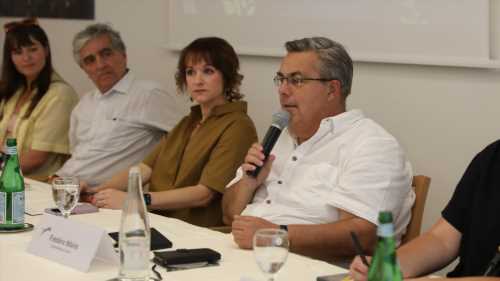You can approach old classics just like new films, argued participants during Locarno’s Heritage Monday panel.
“I talked to an exhibitor in Paris and they don’t consider repertory cinema to be different from contemporary cinema. They are collapsing both models into one and it’s very interesting,” said K.J. Relth-Miller of the Academy Museum.
Swiss Film Archive director Frédéric Maire noted that they also mix “fresh” films with older titles. “This idea of separating them can be useful for communication, but we try to avoid it. Yesterday, I was watching [Daniel Schmid’s 1974 film] ‘La Paloma’ [at the festival] and it felt modern and new. I don’t want to make these distinctions in terms of cultural perspective,” he said.
Such an approach can be beneficial also when it comes to raising audience’s awareness, argued Film Movement’s Erin Farrell.
“When we talk about ‘heritage films’ in the same breath as our new releases, we tend to get more engagement.”
During the panel, which was dedicated to theatrical distribution, exhibition and streaming of classics and moderated by Jay Weissberg, artistic director of Italy’s Pordenone Silent Film Festival, the experts shared tips that help them reach new – and often much younger – viewers.
“Let’s call a cat a cat: ‘heritage film’ is not a bad word. But we do have a lot of fun creating marketing [strategies],” said Elise Cochin of MK2, recalling a recent collaboration with artist Akiko Stehrenberger on restored films by Claude Chabrol.
“She did a series of badass posters. It’s really important to sometimes approach these films as new in order to bring in a broader audience.”
But while the already acclaimed titles are a relatively easy sell, unknown discoveries often remain unwatched.
“People, or at least our Spanish audience, only care about one or two big titles. If it’s Chantal Akerman, it’s ‘Jeanne Dielman, 23 quai du Commerce, 1080 Bruxelles’,” said Filmin’s Jaume Ripoll.

“It’s an ongoing challenge to stimulate our back catalogue. [Sergio Corbucci’s] ‘The Great Silence’ is always going to do well, but they are not all cult classics,” agreed Farrell, with Relth-Miller noting that while major titles tend to dominate, they can often serve as a “gateway to more exploration.”
But the COVID-19 lockdown helped to increase the curiosity of audiences, panelists argued.
“There is a new generation coming to cinema now. I am starting to see that, basically, it happens every five years. Whenever I feel I am showing ‘The Conformist’ again, whenever I feel I am in a rut, I remind myself there will always be people coming to see it for the very first time,” said Relth-Miller, with Ronald Chammah of Les Film Camelia chiming in: “Seven years ago, when we would show a classic, the main audience used to be older. Now, after the pandemic, it’s young people.”
While “marketing is very important for classic movies,” he observed, traditional promotional strategies don’t always work. Relth-Miller praised radio interviews and podcast appearances over print media.
“I have been on the radio three times in the past two weeks, speaking about our silent film program, and our attendance doubled after they premiered.”
Maire added: “We are thinking about TikTok, we are also creating a podcast now. We are trying to create an audience consisting of young people interested in seeing something else – different from what they see in the global market.”
Or those simply looking for a unique experience.
“The idea of ‘an event’ is still essential. Before the [Locarno screening] of Claude Goretta’s ‘If the Sun Never Returns,’ I was saying: ‘There won’t be that many people in the room.’ The cinema was packed – also with young people,” said Maire.
But while attracting the viewers with original prints, for example, can be a “double-edged sword,” said Relth-Miller – “When the print isn’t up to the standards they expect, we will hear about it” – establishing trust should be an absolute priority.
“When there is trust, the audience can go out on a limb with you. They know you will take them somewhere interesting.”

Read More About:
Source: Read Full Article
